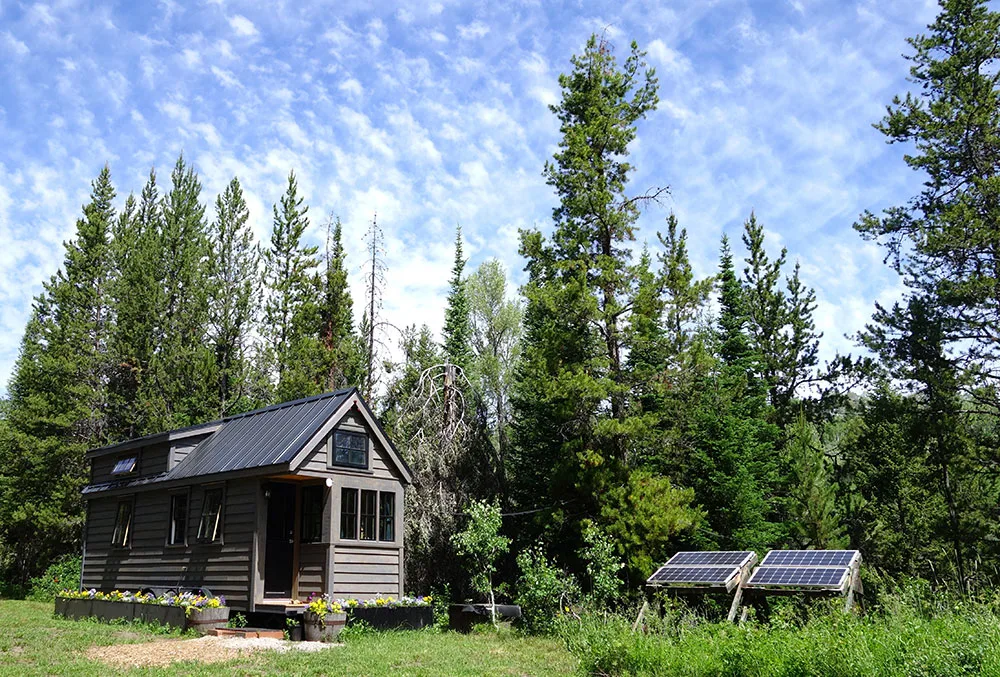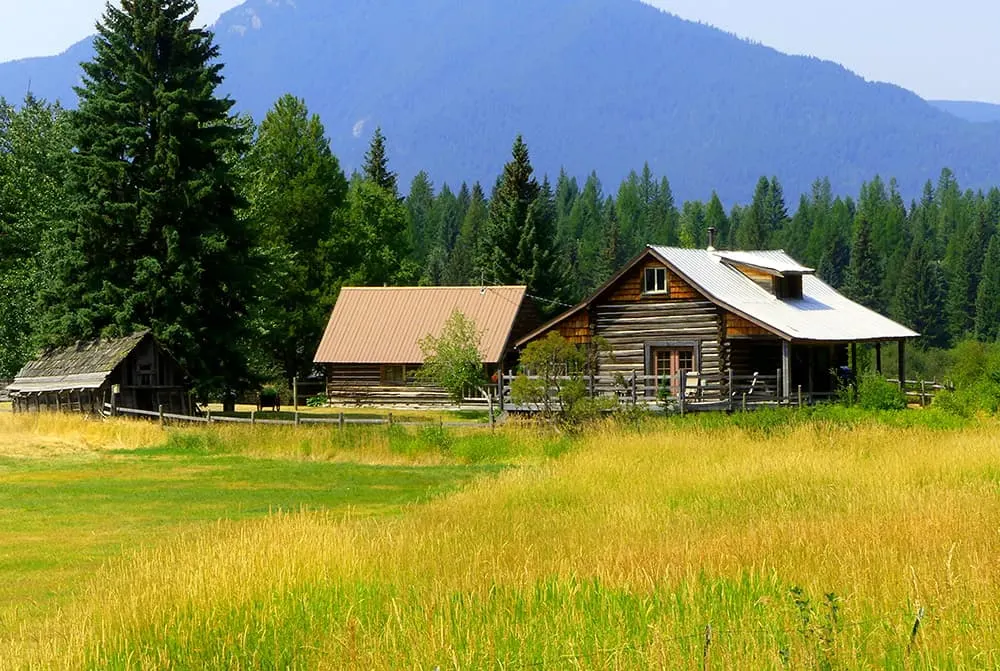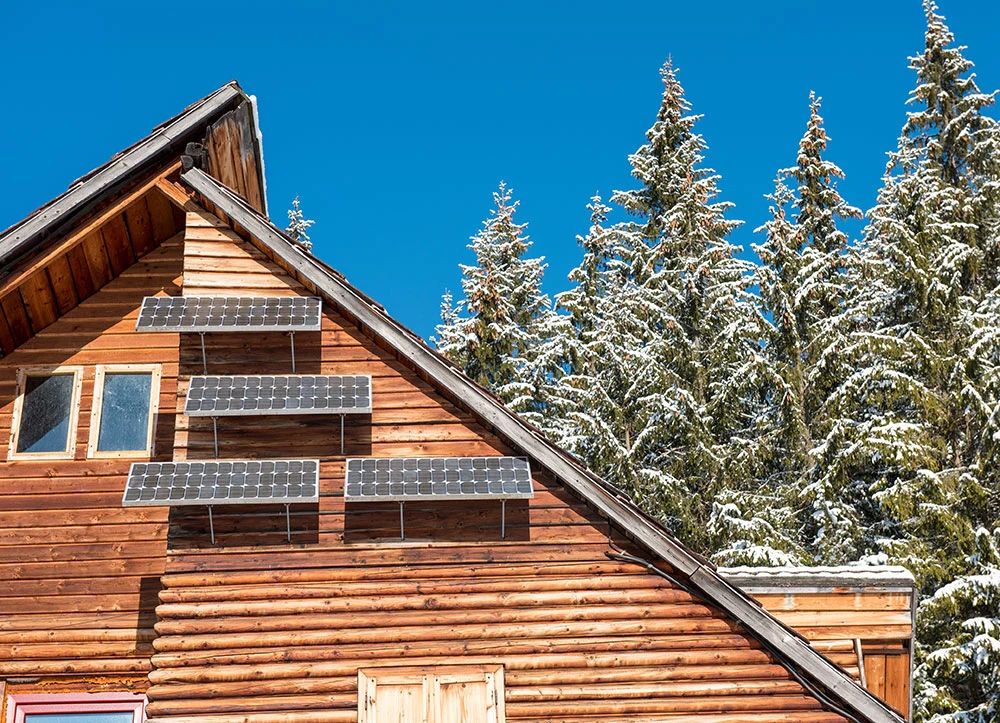Welcome to our guide on living off the land, where we delve into the self-reliant lifestyle of homesteading and off-grid living. This guide offers practical tips and advice for achieving success in homesteading, whether you are new to the concept or looking to enhance your self-sufficiency.
Living off the land involves relying on your own resources and skills to meet your basic needs, creating a sustainable and fulfilling life. Let’s explore the principles, benefits, essential skills, and challenges of this rewarding lifestyle.

Embracing a Self-Sufficient Lifestyle
In our interconnected world, many individuals seek to reduce their dependence on external systems and establish self-sufficiency. A self-sufficient lifestyle involves taking control of one’s basic needs and becoming more self-reliant. One effective way to achieve this is through off-grid living, where individuals rely on their own resources and skills to meet their daily requirements.
Off-grid living promotes self-sufficiency by disconnecting from traditional power, water, and food supply systems. Instead, individuals harness renewable energy sources, implement sustainable farming practices, and develop skills for preserving food and resources. This approach reduces environmental footprints, provides autonomy, and fosters a deeper connection with nature.
The principles of self-sufficiency and off-grid living encompass sustainable practices, eco-friendly systems, and essential skills for living off the land. Let’s delve into these foundational aspects.
The Benefits of Homesteading
Homesteading offers numerous benefits for individuals and the environment, including increased self-sustainability, reduced environmental impact, and enhanced well-being.
Increased Self-Sustainability
By growing their own food, raising livestock, and practicing sustainable living, homesteaders reduce their dependence on external systems and become more self-sufficient. This provides a sense of empowerment and resilience, fostering a deeper connection to nature and the land.
Reduced Environmental Impact
Homesteading promotes sustainable practices that positively impact the environment. Growing organic produce, using renewable energy sources, and managing resources efficiently minimizes carbon footprints and conserves natural resources. This commitment to sustainability helps mitigate climate change and supports planetary health.
Enhanced Well-Being
Living a simpler, more connected life on a homestead leads to greater satisfaction and fulfillment. Homesteaders often experience a deeper sense of purpose, improved mental well-being, and increased physical health. The slower pace of life, close relationship with nature, and meaningful work contribute to a holistic and balanced lifestyle.

Essential Skills for Living Off the Land
Living off the land requires a diverse range of skills to achieve self-sufficiency. Here are some essential skills for a successful off-grid lifestyle:
Farming Techniques
Efficient and eco-friendly farming techniques are crucial for growing healthy crops. Explore organic farming practices, permaculture design principles, and methods like aquaponics and vertical gardening. Composting enriches your soil naturally and boosts plant growth.
Food Preservation Methods
Food preservation is essential for maintaining a year-round food supply. Master canning, pickling, fermenting, and dehydrating to maximize your harvest and reduce waste. These methods keep your homegrown produce fresh and nutritious, even during lean months.
DIY Projects and Self-Sustainability
Enhance self-sufficiency by building essential structures and systems on your homestead. Learn basic carpentry skills to construct chicken coops, raised beds, and rainwater catchment systems. Develop knowledge of renewable energy options and build solar panels or wind turbines to power your off-grid haven. Embrace DIY projects that promote sustainability and reduce reliance on external resources.
Resources for Skill-Building
To cultivate your skill set, seek educational resources that cater to your interests. Join local farming communities, attend workshops on permaculture, beekeeping, or natural building, and utilize books, online forums, and video tutorials for continued learning.

Overcoming Challenges
Living off the land is rewarding but presents challenges. Here are strategies for overcoming common obstacles:
Unpredictable Weather Conditions
Extreme temperatures and severe storms can impact your ability to grow crops and raise livestock. Build resilience with techniques like crop rotation, selecting weather-resistant plant varieties, and diversifying farming practices. Invest in alternative energy sources, such as solar or wind power, to mitigate power outages.
Limited Resources
Scarcity of clean water, fertile soil, or proper equipment can hinder self-sufficiency. Problem-solving is key. Use rainwater harvesting and conservation methods to ensure a sustainable water supply. Apply permaculture principles to maximize land productivity. Join local homesteading networks to share resources and knowledge.
Pest and Disease Management
Pests and diseases threaten crops and livestock. Use natural and organic methods like companion planting, beneficial insect release, and crop rotation to deter pests and prevent diseases. Regular inspections and early detection allow for prompt action.
Isolation and Loneliness
Homesteading can lead to feelings of isolation. Connect with local homesteading communities, join online forums, and participate in workshops to build relationships and gain support from fellow homesteaders.

Tips for Success When Living Off the Land
To thrive in an off-grid lifestyle or homesteading, consider these practical tips for success:
- Start small: Begin with manageable projects and gradually expand. Focus on mastering one skill at a time to avoid feeling overwhelmed.
- Plan and prioritize: Create a detailed plan outlining your goals, resources, and timelines. Prioritize essential tasks to ensure steady progress.
- Learn continuously: Invest time in learning new skills through books, online resources, workshops, and local communities. Stay updated with sustainable practices and innovative techniques.
- Build a support network: Connect with other homesteaders and off-grid enthusiasts. Sharing experiences, resources, and advice can be invaluable.
- Diversify your food sources: Grow a variety of crops and raise different types of livestock to ensure a balanced diet and reduce dependency on any single source.
- Implement water conservation: Use rainwater harvesting, greywater systems, and efficient irrigation techniques to manage water resources sustainably.
- Practice renewable energy: Invest in solar panels, wind turbines, or other renewable energy sources to power your homestead and reduce reliance on traditional energy grids.
- Stay organized: Keep detailed records of planting schedules, livestock care, and maintenance tasks. An organized approach helps in managing the homestead efficiently.
- Be prepared for emergencies: Have contingency plans for unexpected events like extreme weather, equipment failure, or health issues. Stockpile essential supplies and maintain first aid kits.
- Focus on soil health: Healthy soil is the foundation of successful farming. Regularly test soil, use organic compost, and practice crop rotation to maintain fertility.
- Preserve and store food: Develop skills in canning, fermenting, drying, and freezing to preserve your harvest and ensure a consistent food supply throughout the year.
- Practice sustainable living: Reduce waste, recycle materials, and use eco-friendly products to minimize your environmental footprint.
- Stay flexible and adaptable: Be open to adjusting your plans and methods as you learn and face new challenges. Flexibility is key to overcoming obstacles and finding better solutions.
- Take care of your health: Ensure you maintain a balanced diet, get regular exercise, and take time to rest. Your well-being is crucial for sustaining the homesteading lifestyle.
By following these tips, you can enhance your chances of success in living off the grid or homesteading, leading to a more sustainable, fulfilling, and resilient lifestyle.

Conclusion
Living off the land offers self-reliance, sustainability, and a deeper connection to the natural world. By acquiring essential skills, overcoming challenges, and embracing the benefits, individuals can create a fulfilling and sustainable life off the grid. Homesteading not only enhances individual well-being but also positively impacts the environment. Embrace this journey towards self-sufficiency and sustainable living, and discover the limitless possibilities of living off the land.
FAQ
What is living off the land?
Living off the land is a self-reliant lifestyle that involves relying on one’s own resources and skills to meet basic needs.
How can I embrace a self-sufficient lifestyle?
Embrace a self-sufficient lifestyle by reducing dependence on external systems, practicing sustainable living, and acquiring necessary skills for off-grid living.
What are the benefits of homesteading?
Homesteading offers increased self-sustainability, reduced environmental impact, and enhanced well-being, providing satisfaction from living a simpler, more connected life.
What are essential skills for living off the land?
Essential skills include farming techniques, food preservation methods, and DIY projects to enhance self-sufficiency, enabling individuals to grow their own food, manage livestock, and conserve resources.
What challenges come with living off the land?
Challenges include unpredictable weather and limited resources, but resilience and problem-solving skills can overcome these obstacles.

